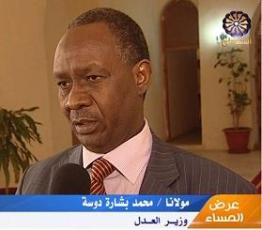Sudan says immunities granted to individuals impeded justice in Darfur
January 16, 2012 (KHARTOUM) – The Sudanese justice minister Mohamed Bushara Dousa made a rare acknowledgement that the immunities granted to individuals have “hindered” bringing justice in the country’s western region of Darfur.

The top justice official said that the former special prosecutors assigned to probe the alleged war crimes in Darfur did not fail but that immunities had frustrated their work.
Dousa pledged that legal procedures will be followed and that those who had perpetuated crimes will be prosecuted particularly those related to violations committed in Darfur.
Last week, the Sudanese justice minister appointed a new special prosecutor for Darfur and later the country’s chief justice established the special court to try the gravest crimes in the war-torn region.
This is part of the requirements stipulated by the Doha Document for Peace in Darfur (DDPD) signed between Khartoum and the Liberation and Justice Movement (LJM) last July.
Since the outbreak of the war between Khartoum and mainly African rebels in Darfur eight years ago, Sudan has downplayed the scale of crimes saying that only 10,000 have died, in contrast to United Nations estimates of 300,000.
The Sudanese government has also insisted that its judicial system is capable of trying any individuals suspected of being involved in war crimes in Darfur.
But a UN commission of inquiry concluded in 2005 that Sudan’s judiciary is unwilling or unable to seriously tackle the issue of human rights breaches there.
As a result, the United Nations Security Council (UNSC) decided in March 2005 to refer the situation in Darfur to the International Criminal Court (ICC). The latter has charged three individuals from the government, including president Omer Hassan al-Bashir, South Kordofan governor Ahmed Haroun and militia leader Ali Kushayb.
All three face charges of war crimes and crimes against humanity but Bashir is also wanted for genocide in connection with claims that he orchestrated a campaign to wipe out the African tribes of Fur, Zaghawa and Masaalit in Darfur.
Over the years Sudan has appointed several special prosecutors and established special courts to go along with them in order to deflect the criticisms over Darfur justice and convince the UNSC to freeze proceedings against Bashir. But to date no high-profile prosecutions have taken place.
Haroun, one of the ICC suspects, slammed the justice ministry in March 2009 after the former Darfur special prosecutor Nimr Ibrahim Mohamed suggested that they could investigate him.
The current South Kordofan governor said that this is inconsistent with the state’s position.
This echoed a move by Bashir in early 2007 blocking the then Sudanese attorney general Salah Abu-Zeid from probing Haroun.
But in recent years a number of Sudanese officials have spoken about difficulties encountered in Darfur prosecutions.
Last year the Justice Ministry Undersecretary and special prosecutor for Darfur crimes, Abdel-Dayem Zumrawi, resigned from his post citing personal reasons. However, sources told Sudan Tribune that Zumrawi was unhappy by what he thought was too much interference in his work by other government agencies.
The privately-owned Al-Sudani newspaper reported at the time that Zumrawi had difficulty overcoming the issue of immunity in his investigations of several incidents that occurred where mass civilian deaths was alleged to have occured, including in Gereida in South Darfur.
A year ago the outgoing state minister for Justice, Bol Lul Wang, told Reuters that Khartoum has not conducted serious investigations into Darfur crimes. He also claimed that the Sudanese government has no will to go after suspects because of the high-level position they occupy.
Sudan’s former spy chief, Salah Gosh, last year rapped the justice ministry over the lack of progress in its Darfur war crimes prosecutions.
“Despite the appointment of a general prosecutor for crimes in Darfur and having several cases pending we have not seen them [cases] presented to the courts,” Gosh said at the National Assembly during deliberations on a report presented by the justice minister on the performance of his ministry.
(ST)
